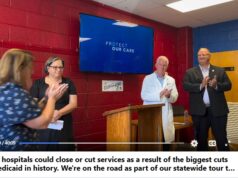Recently, the Washington Post wrote an article about the opioid crisis that was startling to a lot of folks – but, at the same time, was sadly unsurprising. Norton, Virginia – a sleepy little town in Wise County, tucked into the southwestern corner of the Commonwealth – found itself at the epicenter of the opioid crisis, where a staggering 4.8 million narcotic pills were dispensed from area pharmacies the course of six years.
The reasons for this are multifold, but Big Pharma owns the lion’s share of the blame here. For instance, Purdue Pharmaceutical aggressively hawked its painkiller OxyContin, telling consumers that doctors who wouldn’t prescribe it for them didn’t care about their pain. They did this knowing that Medicare and other insurance companies reimburse providers base a large percentage of their reimbursement rates on patient satisfaction scores- an extortion scheme that would make a Mafia Don blush. On the flip side of this, they assured physicians and other providers that OxyContin was perfectly safe to prescribe, and systematically sought to squash any evidence to the contrary.
But I think that one reason pharmaceutical companies have escaped the repercussions they so richly deserve on this is the too-common view of those suffering from narcotic addiction as “junkies”. That if only they had the willpower, if they didn’t have some character weakness that was clearly the result of where they are, they would have pulled themselves up by their bootstraps and wouldn’t be addicted. The state their lives are in is their fault and their fault alone.
These are our mothers and fathers. Our brothers and sisters. Our children, and our neighbors. There isn’t anything wrong with them, and anyone can suffer from opioid addiction – anyone! Opioids physically alter the way the brain functions. They can cause permanent changes in the brain neurochemical feedback system. They’re literally hacking and rewiring your neurological system, which means if you’re a human being? You’re at risk.
Take it from me. I know firsthand. I’ve been clean for eight years. That’s how long it’s been since I almost became just another statistic – and one of the reasons I decided to run for the Virginia House of Delegates this year.
In the summer of 2011, I began intermittently feeling shooting pains that would go through the right side of my abdomen. I initially shrugged it off, but the pain began to increase in intensity and duration. It’d begin a few moments after I started eating, and would eventually feel like someone was driving a red hot spear from my liver to my shoulder. After a number of doctors appointments and competing theories, diagnostics finally proved conclusively that my gallbladder was shot.
For those of you who’ve never had gallstones or gallbladder pain, let me assure you that it is infinitely worse than childbirth. When I said “red hot spear,” I wasn’t joking. I was born and raised to be stoic, as the expectation for this among women where I come from is almost universal- you don’t let anyone know you’re in distress, EVER, end of story. You tough it out and soldier on. But there was no toughing this pain out. It was debilitating. It occupied every fiber of my being. It was enough to make you wish you were dead if only for the sudden relief of pain you would hopefully feel in the moment before it all went black.
But my vital signs and lab work were okay; my gall bladder needed to be taken out, but “it wasn’t emergent.” I get it – people who are suffering from multi-organ failure or had pressing surgical needs come first. The soonest the surgeon could get me on the schedule was two weeks out, and in the interim, I was prescribed 2 mg of hydromorphone (commonly known as “Dilaudid”) every four to six hours for the pain.
I didn’t have any experience with narcotics, so I didn’t question the dosage or frequency. A friend of mine who is an ER nurse told me that’s the sort of dose they usually reserve for end-stage cancer patients or people with serious bone fractures. I had no idea I was just given specific instructions to make sure I stayed ahead of the pain and to take medications on a schedule, or else I might end up in the emergency department with pain that was beyond control.
Those two weeks exist in my memory like a fog, a barely remembered dream. My husband and my two toddlers, like specters, as I would go from sleeping to pain pill to sleeping again. I lost an enormous amount of weight, as I ate nothing but Jell-O, and even that would trigger spasms of pain. I couldn’t wake up and exist, much less work or take care of my family.
My husband, Jeff, juggled everything as he desperately shifted his work schedule around. The company he works for went out of their way to offer FMLA and allowed him to work from home for over a month during pre-surgery and recovery. Other family members and babysitters for me helped out when he had run errands or could not be available. Through some combination of luck and, friends, and family looking out for us, we made it through all those logistical challenges.
The day of the surgery came. It didn’t go well; I obviously don’t remember it, but my husband told me that the moment he saw the surgeon coming out into the surgical waiting area with a terse look on his face was a pure and unadulterated fear like he’d never felt before. I’d lost too much blood and was acutely anemic. This was actually due to another chronic condition that ended up taking a few years to get to the bottom of, but nobody knew that at the time.
All I remember is waking up in the post-surgical recovery unit. The hospital doctor who was taking care of me stopped my narcotics almost cold-turkey. If you want to talk about a hell that was almost comparable to the pain I’d been feeling before the surgery, it was almost topped by dealing with post-surgical complications. I was trying to figure out how to handle bile backing up into my stomach, my newfound anemia, and being in full-blown narcotic withdrawal.
I longed for it. I did. I felt it in the tips of my fingertips. Just one. Just one more pill, please, one more and I’ll be fine. I’ll be fine after that.
The story doesn’t end here. Not by a long shot. But revisiting it now makes me relive everything, over again, and it’s been a struggle to get this much out.
All I’ll say is without my family and friends supporting me without question, I… I don’t know what would have happened. I truly don’t. It was bad enough that I endured a dental extraction and procedure with nothing more than ibuprofen and lidocaine a few years later, refusing anything stronger than that.
But I’m not a junkie. I don’t have mental health problems. I’m not “weak” or need to “just tough it out.” I’m just like anyone else.
The opioid crisis is endemic to the Shenandoah Valley- and while politicians in Richmond argue about what to do, making big shows of how much they care while crying crocodile tears, the people in my district are hurting. They’re suffering. They’re dying! And I refused to let that go on for one year more, to let another of my neighbors become the kind of statistic I narrowly avoided being.
I’m going to win my race this November. I’m going to go to Richmond. And I’m damn well going to make a difference for the people in my district. But I need your help to do it! We are building a people-powered campaign. A grassroots movement to bring progressive change, and turn rural Virginia blue.
Donate today. Volunteer to knock doors, write postcards, and let everyone know about what we’re doing out here. With your help, we WILL get this done- and make sure not one more Virginian becomes “just another statistic”.
Thank you!
Jennifer Kitchen














![Monday News: Trump’s Lunacy Pushes China, Russia, India, etc. Together; “Happy Labor Day. Donald Trump and Elon Musk Are Screwing Workers.”; “Where is the [media’s] intense focus on Trump’s failing health?”; ““Trump says he is not a dictator. Isn’t he?”](https://bluevirginia.us/wp-content/uploads/2025/09/montage0901-100x75.jpg)